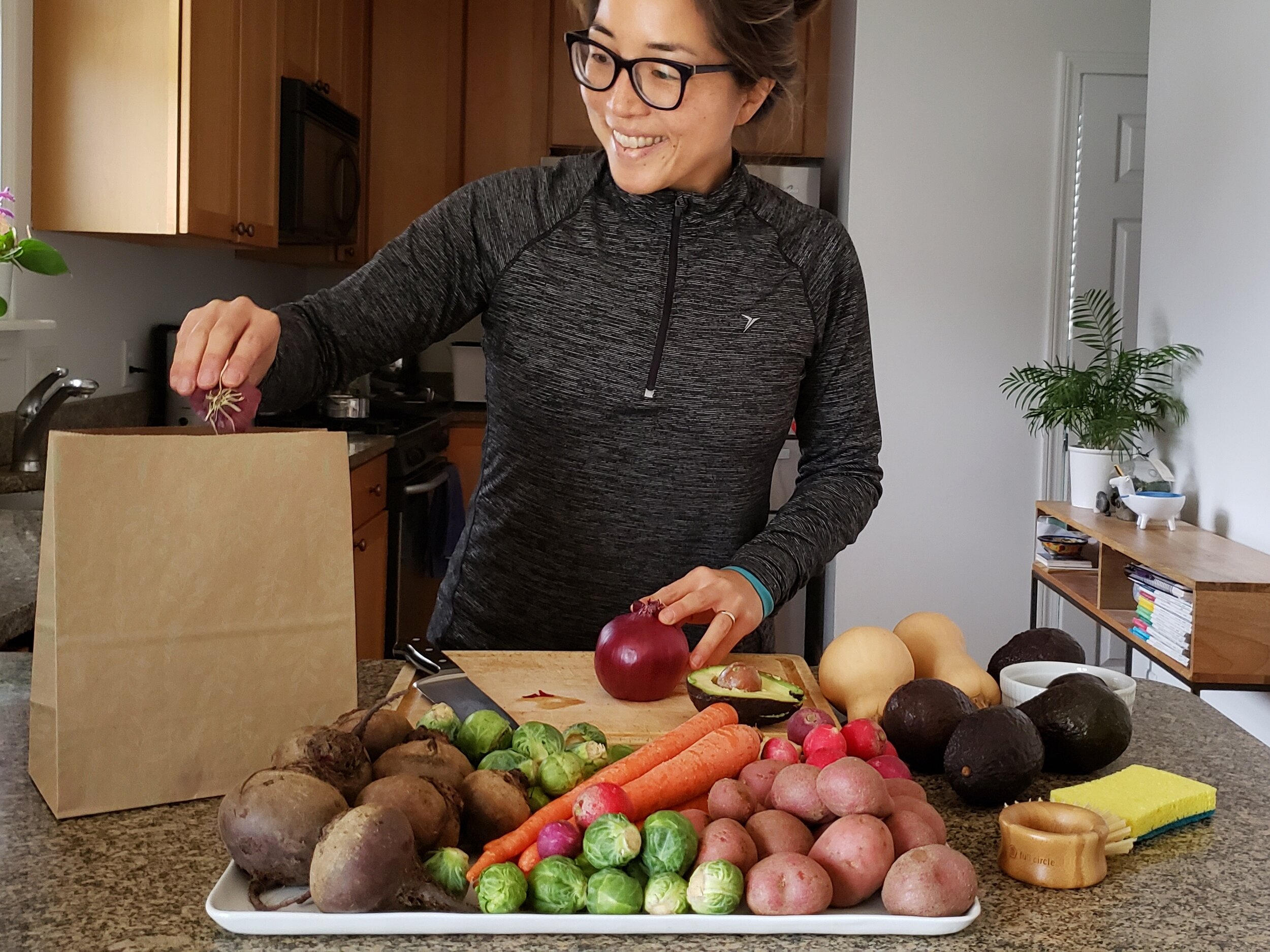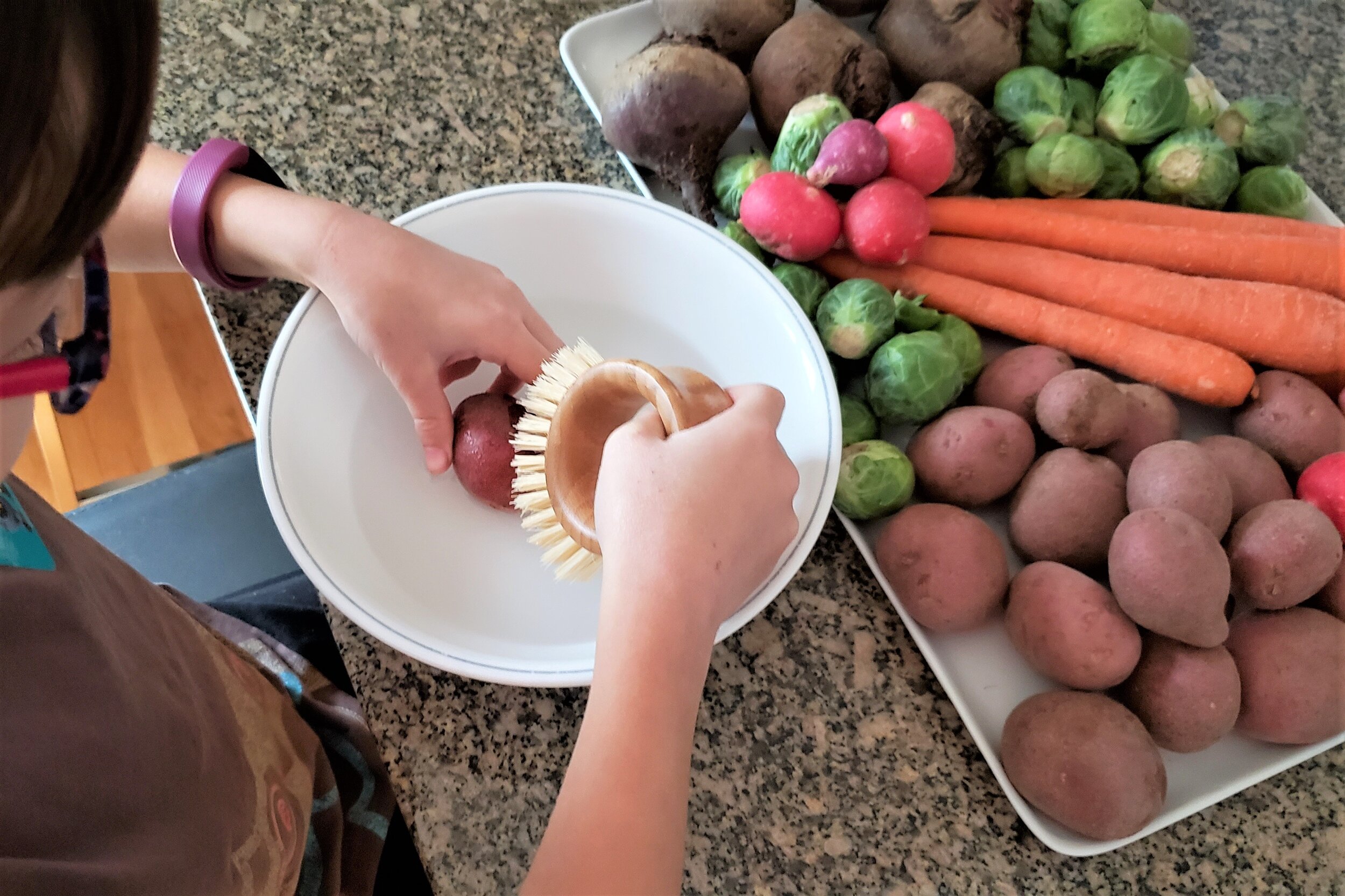7 Eco-Friendly Kitchen Survival Tips
As someone who loves to cook and bake, one of the trickiest things—especially around the holidays—is balancing how much time you’re working in the kitchen with how much time you’re spending with your guests. I will admit, in the past I have definitely let time with my guests suffer given my desire to make show-stopping food. So over the years, I have worked both on simplifying what I’m making, and also how I’m operating in the kitchen. Today, in partnership with Full Circle, I wanted to share my 7 favorite eco-friendly kitchen survival tips; get ready to make your life easier and more eco-friendly!
1. Use a grocery list app
If paper is your jam, that’s fine too, but definitely start your holiday planning with a grocery list (I use a super simple grocery list app called Out of Milk). Review your recipes in front of your refrigerator/pantry as you add to your grocery list so you can avoid refrigerator log jam problems and ultimately food waste. Refrigerator Tetris is no joke this time of year, especially if you (like me) do not have the luxury of a back-up refrigerator or freezer.
2. Compost as you food prep
Regular readers know I am a devoted composter and the reason I want to mention it here is because you will invariably generate a lot of produce waste as your cooking volume goes up during the holidays and it would be so much better for that waste to be composted than tossed in the trash! Check out my composting in 6 easy steps post to learn more, but if you want a super quick entry into the process and don’t have an indoor receptacle, grab these Full Circle compostable paper scrap sacks. They’re a great solution for high volume produce waste! (And if you don’t have room for an outdoor composter, you can opt for compost pickup. I’ve seen Black Earth Compost pick up bins popping up in my neighborhood!)
This is basically what I look like every Sunday; prepping and roasting vegetables and composting up a storm!
3. Enlist little helpers
I’m a huge proponent of teaching kids to cook and the holidays are the perfect time to enlist their help and teach them some eco-friendly kitchen skills! Turn on some tunes and get going! One of Violet’s favorite games is to pretend we’re on a cooking competition and we role play being contestant and judge.
4. Use a veggie brush
This is going to sound ridiculous but for a long time, a veggie brush seemed like a splurge-type item for me, even though they cost less than $5. I think it was more of a, “Well, do I really need that?” kind of thing and the answer is YES, because I now waste way less water and time using a brush to clean veggies instead of soaking them in a bowl of water and trying to remove bits by hand. It turns out Violet loves veggie cleaning too!
Cleaning veggies apparently is way more fun when you have a cute brush. Violet is into it!
5. Convert to glass for food storage
I cannot recommend enough converting to glass for food storage. Not only is glass safer for food storage but you’ll also save on dishwashing time and water use in that you can heat up leftovers right in the storage containers.
6. Be smart with your dishwasher
I recommend loading your dishwasher full (but not overloaded, obviously) to save water and running it at night to: 1) reduce day-time noise (I am super sensitive to this), and 2) let time do the work to dry everything out (vs. needing to dry items by hand if you’re immediately pulling items out of the dishwasher once it finishes running).
7. Get sink tools that work
Given that I love roasting and baking I always have a lot of things that can’t go in the dishwasher, and let’s just say the kitchen can become a disaster zone very quickly. Make cleanup speedier with eco-friendly tools that work! Full Circle’s power couple pan scrapers include a recycled plastic half for use on stainless steel and ceramic, and a nylon half for use on cast iron and non-stick pans. I also love these walnut scrubber sponges (as in, the scrubbing part is made of walnut shells!).
And speaking of sponges, Full Circle recently launched the #StartWithASponge campaign to inspire people to take sustainable action in a small, doable way! A majority of the 400 million sponges thrown away each year in the United States are plastic and will take centuries to break down. They are asking people to pledge to swap a plastic cleaning sponge with a natural (plant-based) cellulose cleaning sponge. This small action will have a big impact!
If listening/watching is your preferred method to absorb information, here’s a video version of this post!
Disclosure: This post reflects a compensated editorial partnership with Full Circle, purveyor of amazing eco-friendly home care products. I fell in love with their products earlier this year and my family legit cannot believe how much more I’ve become invested in sweeping and composting as a result!
7 eco-friendly kitchen survival tips



